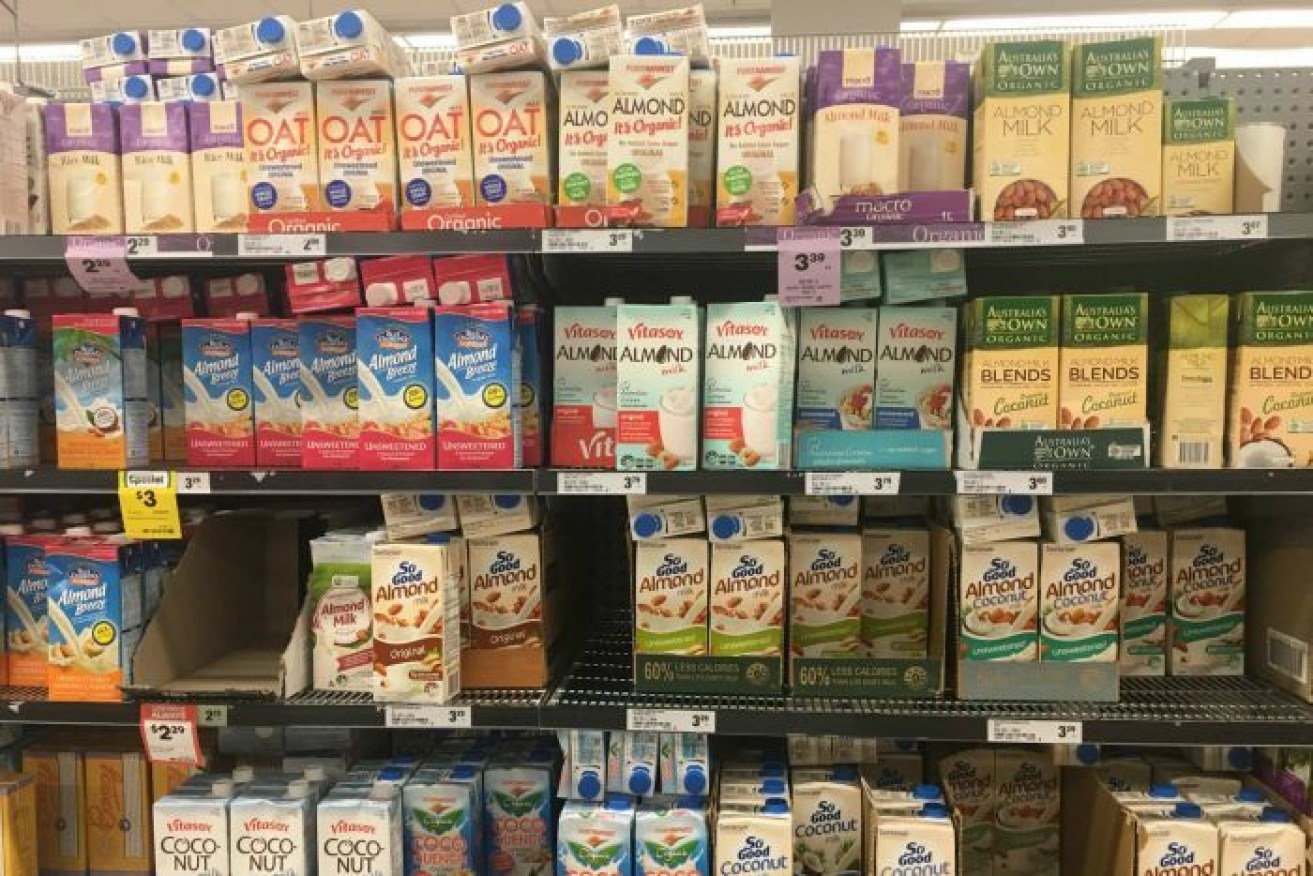Lapping it up: Australians turn to alternative milks

The range of non-dairy milks available in Australia is rapidly expanding. Photo: Landline
Dairy milk has been flying off the supermarket shelves as consumers continue to sympathise with Australia’s dairy farmers, following the Murray Goulburn crisis.
But so-called “alternative milks” are rising in popularity, and new research shows consumers are increasingly lapping them up.
Supermarkets now stock a range of plant-based milks, including soy, almond, coconut, hazelnut, rice, oat and more recently, macadamia milk.
“While the incidences of lactose intolerance have been increasing there have also been food trends that recommend avoiding cow’s milk,” IBISWorld analyst Lauren Magner said.
Ms Magner has been investigating the rise of the alternative milk market — focusing on soy and almond milk — and estimated the industry to be worth about $150 million.
“This figure has been growing quite quickly over the past five years as the popularity of alternative milks has grown, and we have expected 6 per cent per annum growth over the past five years,” she said.
Milk consumption in Australia is higher than most Western nations, with figures from Dairy Australia showing the average Australian consumes 105 litres of fresh milk per year.
“There has been a really small increase in that non-dairy industry over the last few years,” he said.
“Looking at the extensive range of plant-based milk in the supermarket you could be forgiven for thinking [it’s growing in popularity], but the data shows that very few Australians are drinking those alternatives instead of cow’s milk.
“Statistics from the Australian Health Survey show that around seven-in-10 are having cow’s milk, with only three-in-10 having those alternatives.”
Landline asked supermarket giants Woolworths and Coles how much alternative milk they sold compared to cow’s milk, but they would not say for “commercial” reasons.
US shifts away from dairy milk
In the United States consumers are turning away from traditional dairy in droves, leading the push towards plant-based milks.
In a recent study, global market analyst Mintel found sales of alternative milks in the US rose by 9 per cent last year alone.
It also found dairy milk sales decreased by 7 per cent last year, costing the US industry $17.8 billion.
United States’ milk sales were projected to drop another 11 per cent through to 2020, due to greater competition from sugary drinks, juice and plant-based milk.
But Mr Robinson said that was not the case in Australia.
He said non-dairy milk sales made up 6 per cent of all milks sold in supermarkets, only up half-a-per cent in three years.
“There’s been a really small increase in that non-dairy industry over the last few years, but what we see is consumers tend to move within the category, for an example from a soy beverage to an almond beverage, rather than a big shift from cows’ milk,” he said.
Despite disagreeing on the extent to which nut milks are rising in popularity, Ms Magner and Mr Robinson agreed the traditional dairy industry in Australia was not at risk.
“The dairy industry still has a significant market in Australia, so per capita of cow’s milk consumption is still 20 times more than soy,” Ms Magner said.
“So IBISWorld doesn’t think the dairy industry will suffer from large declines in market share to the milk alternatives industry for the short-to-medium term because most Australians still drink traditional milk.”

More and more baristas are making coffees with almond, soy or coconut milk. Photo: Landline
Is plant-based milk better?
Melbourne’s coffee scene is buzzing with cafes that only sell coffees made from plant-based milks.
“At the moment we are using coconut, almond and soy milk as our base milks, we don’t use any cow’s milk here,” Zoe Davies, a barista at Macha Mylkbar in St Kilda, said.
“I think people are more and more leaning towards plant-based milks just because of the ethical and health issues that have been raised recently with the consumption of dairy.
“Plant-based milks are a lot lower in certain fats and I think people are leaning more towards a plant-based lifestyle in general.”
https://www.instagram.com/p/BLM3eusDp87/?taken-by=matcha_mylkbar&hl=en
But Tim McMaster, a dietitian with the Dietitians’ Association of Australia, said consumers needed to be wary of plant-based milks being promoted as “healthier”.
“It’s not a straight answer,” he said.
“Cow’s milk probably comes out on top for nutrient quality, it has 10 essential nutrients that are fantastic for our health and our body.
“The majority of alternative milks are lower in energy, or kilojoules, and can contain a lot less fat which helps with the kilojoule content being lower.
“But unfortunately a lot of them are considerably low in protein and calcium, they don’t have much calcium at all.”

Soy milk is the best alternative to cow’s milk nutrition-wise. Photo: Getty
That is, unless they are fortified. Many alternative milks add key nutrients, like calcium, to make them more comparable to the health benefits of cow’s milk.
“Most of them are fortified these days to meet up with the nutritional quality of milk when it comes to cow’s milk for calcium intake,” he said.
“Out of all the milk alternatives, soy milk which has been out the longest, still comes out on top. It is closest to the nutritional complexity of what cow’s milk is.”
Ms Davies said consumers wanting to make the switch to plant-based milks for health reasons needed to do their research first.
“A lot of people do point the finger at nut milk for being high in sugar and for not having the ample amount of protein, and compared to dairy milk not having the same amount of calcium,” she said.
“It is about picking the milks that are the better ones on the market. Most nut milks are fortified with B12, Vitamin D and folate and a lot of soy milks are also complete proteins because they contain the nine amino acids.”

Is it fair to call almond milk “milk”? Probably not. Photo: Getty
‘Nut milk’ or ‘nut water’?
Another criticism is plant-based milks do not actually contain much of the ingredients after which they are named.
For example, some bottles of almond milk only contain 2 per cent of almonds, with the main ingredient listed as “filtered water”.
That has prompted some tongue-in-cheek criticism from some in the dairy industry.
“It’s not really fair to call it ‘nut milk’,” Lismore dairy farmer Craig Waddell said.
“I would have thought ‘nut water’ would be a more normal thing to call it. Not an actual milk, because milk is milk.”
– ABC








